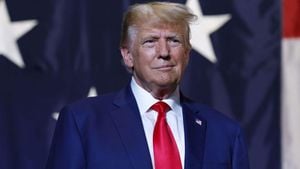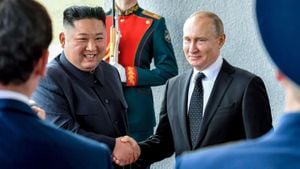Donald Trump’s recent tariff threats have reignited concerns over economic instability, particularly aimed at members of the BRICS nations—Brazil, Russia, India, China, and South Africa. These threats come as Trump publicly announced potential 100% tariffs against these countries, particularly if they attempt to shift away from the U.S. dollar as the dominant currency for international trade.
During his campaign, Trump stressed the importance of maintaining the U.S. dollar's supremacy, indicating stern consequences for those who challenge this status. He voiced his intentions to impose tariffs as part of his plan to counter any movement by BRICS toward creating their own common currency. The suggestion of utilizing local currencies for trade, spearheaded by BRICS leaders like Brazilian President Luiz Lula da Silva, poses direct competition to U.S. economic influence globally.
Experts warn these tariffs, if enacted, would not only increase prices for American consumers but could also tarnish the United States’ position as the world’s leading financial powerhouse. The notion of tariffs may sound appealing on the surface, purporting to protect domestic jobs and industries, but the reality is much more complex. Tariffs directly cause higher prices for imported goods, which are then passed down to consumers. Consequently, Americans could end up bearing the financial burden of these policies, leading to increased living costs and reduced purchasing power.
Examining the broader economic repercussions, there are fears of triggering retaliatory tariffs from the affected nations. History has shown us the negative impact of trade wars, highlighting incidents from Trump's first term where goods worth $380 billion were subjected to tariffs. The result? A decline in living standards for U.S. consumers and no significant increase in domestic employment, with many workers actually losing their jobs as retaliation from trade partners picked up steam, affecting American businesses.
Alongside the threat of tariffs is the potential for broader economic ramifications. The moves to disrupt established trade relationships with key partners like Canada and Mexico, combined with aggressive stances against China, may lead to isolation from lucrative markets. The interconnectedness of today’s global economy means one nation’s tariffs can drastically affect another’s economy, resulting in wider trade imbalances and instability.
The anticipation surrounding Trump’s return to the presidency has put businesses on alert, particularly those reliant on international supply chains. Trump's administration is already signaling its intent to adopt aggressive trade measures upon taking office, raising alarms among corporate leaders. Uncertainty looms as companies brace for the consequences of heightened tariffs, potentially leading to supply chain disruptions and increased production costs derived from the need to source materials locally.
Adding layers to the complexity, the global financial system is watching closely as Trump's tariffs could undermine the dollar's status as the world’s reserve currency. A shift toward alternative currencies for trade could gradually erode trust and reliance on the dollar, fostering momentum behind efforts headed by BRICS to pursue their financial autonomy. This erosion of trust could lead to testing new pathways for currency assessments, encouraging players to seek alternative payment systems without the dollar.
China's market, which has been trying to pivot its strategy to mitigate risks sparked by U.S. economic policies, could adapt by turning to other markets and suppliers outside the United States. This shift may pivot exports to regions such as ASEAN, where China could seek to bolster its economic footprint even as it grapples with the uncertainty of U.S.-led tariffs.
While on the surface, tariffs appear to be restrictive measures aimed at protecting American jobs, the underlying dynamics suggest troubling outcomes not just for international relationships, but also for the U.S. economy itself. Should countries retaliate or pivot away from U.S. products altogether, American consumers will undoubtedly feel the pinch at their wallets, driving home the reality of how interconnected both the national and global economies have become.
Analysts are left to ponder the potential backlash of Trump’s proposed tariffs. Will they serve as leverage, or will they ignite trade wars, driving the global economy down the rabbit hole? With Trump's approach to economic policy rooted deeply in protectionism, the fear of imminent trade wars looms large. Coupling this with the challenge of managing migration and drug trafficking—his proposed justifications for these tariffs—highlights how intertwined these diplomatic and economic strategies can be.
Presenting another layer of complication, Trump's claims to manipulate tariffs as tools against drug trafficking and migration fall flat against the reality of international dynamics. His threats fundamentally misunderstand the nature of global trade; rising migration rates and drug dissemination are multi-faceted issues needing comprehensive solutions beyond tariff legislation.
Beyond trade, the perception of American power is at stake. Critics argue such threats make the U.S. appear weak on the global stage, potentially allowing countries like China and others to exert more financial dominance, leading to unpredictable economic dynamics. If tariffs are enforced, they may unintentionally galvanize BRICS members toward entering more cooperative economic endeavors, countering U.S. interests significantly.
With speculation about the effectiveness and the extent of the proposed tariffs, many within the U.S. and across the globe grapple with the nuances of how these changes will manifest. The hope is to avoid retaliatory responses. Staving off aggressive trade policies is necessary, particularly when the global economy is already precarious as seen through various challenges including inflation, supply chain issues, and the looming shadows of geopolitical conflicts.
Trump's inclination to reach for tariffs as immediate solutions invites scrutiny, raising questions about American economic resilience, diplomatic relationships, and the future of financial leadership globally. At the intersection of commerce, politics, and foreign relations, the impacts of these tariffs are unprecedented and warrant close observation by all economic participants and stakeholders.
Economic discourse will likely turn again toward the volatility incited by tariffs as America navigates the unknown seas of Trump's potential presidency. Each tariff threat is not merely about numbers and economies; it propels significant shifts—both nationally and internationally—that require careful consideration and strategic negotiation to cultivate beneficial trade relationships moving forward.



